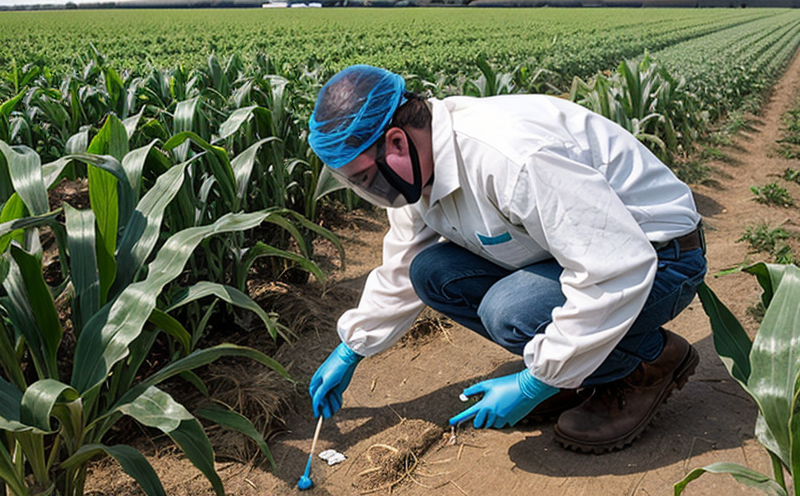Lambda-Cyhalothrin Residue Testing in Crops
As a leading agricultural laboratory, we specialize in ensuring that crops meet stringent quality and safety standards. Lambda-cyhalothrin is one of the most widely used synthetic pyrethroid pesticides globally, renowned for its rapid knockdown effects on pests. However, due to its high toxicity to humans and wildlife, strict residue limits are imposed by regulatory authorities worldwide.
The presence of lambda-cyhalothrin residues in crops can pose significant risks if not controlled properly during the application process or post-harvest handling. Our comprehensive testing service ensures that these residues fall well within permissible levels set by international standards such as ISO, ASTM, and EU regulations. This is critical for maintaining consumer trust and ensuring compliance with local laws.
Our team of experts uses advanced analytical techniques including gas chromatography-mass spectrometry (GC-MS) to accurately measure lambda-cyhalothrin residues in various types of crops like fruits, vegetables, grains, and oilseeds. Proper sample preparation is crucial; this involves selecting representative samples from different parts of the crop and ensuring they are free from contamination.
The importance of accurate residue testing cannot be overstated. It plays a vital role in safeguarding public health by preventing potential harm caused by excessive exposure to harmful chemicals. Additionally, compliance with regulatory requirements helps protect producers against penalties and maintains market access.
Our state-of-the-art facilities and experienced personnel guarantee reliable results that are both precise and repeatable. By leveraging cutting-edge technology and adhering strictly to established protocols, we deliver accurate data which can be used by stakeholders involved in crop production and marketing processes.
Scope and Methodology
| Aspect | Description |
|---|---|
| Crop Types Tested | This includes fruits, vegetables, grains, oilseeds. |
| Analytical Techniques Used | GC-MS for precise measurement of lambda-cyhalothrin residues. |
| Sample Preparation Steps | Selecting representative samples; ensuring they are free from contamination. |
| Data Reporting Standards | ISO, ASTM, EU regulations compliance. |
| Quality Control Measures | Incorporating rigorous internal and external calibration checks throughout the process. |
| Turnaround Times | Vary depending on complexity but typically within 5-7 business days. |
Industry Applications
The demand for accurate residue testing in lambda-cyhalothrin is particularly high among quality managers, compliance officers, and R&D engineers who need to ensure product safety. For these professionals, our service offers peace of mind knowing that their products comply with international standards.
Furthermore, this testing process supports the development of safer pesticides by providing valuable feedback on how residues behave under different conditions. This information is invaluable for researchers aiming to improve pest control methods while minimizing environmental impact.
In addition to supporting R&D efforts, our service also assists in monitoring compliance with regulatory requirements. By regularly assessing pesticide levels in crops, we help producers stay ahead of potential issues before they become public concerns.
Our comprehensive approach ensures not only that individual lots are safe but also contributes towards broader industry initiatives aimed at improving overall crop quality and safety.
International Acceptance and Recognition
The use of lambda-cyhalothrin has been regulated by numerous countries around the world. Compliance with these regulations is essential for maintaining market access and ensuring public health.
- United States: Lambda-cyhalothrin must be used according to label instructions, which include specific application rates based on crop type.
- European Union: Maximum residue levels (MRLs) are set for various crops following the principle of "no observable adverse effect level" (NOAEL).
- Australia and New Zealand: Compliance with the National Registration Authority is required, ensuring that residues do not exceed specified limits.
Our testing service adheres strictly to these guidelines, providing accurate and reliable data that can be used by stakeholders involved in crop production and marketing processes. This helps ensure that products meet international standards and are safe for consumption.





